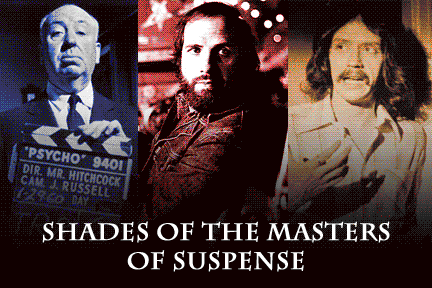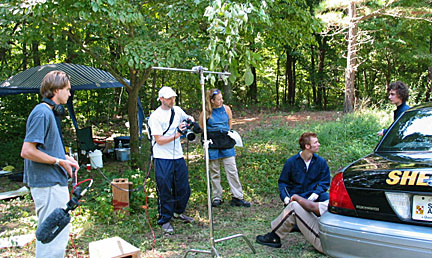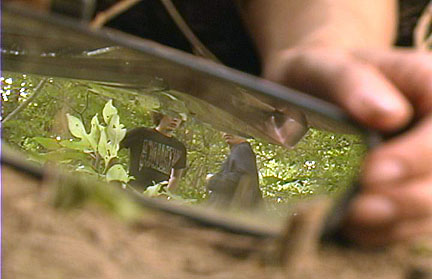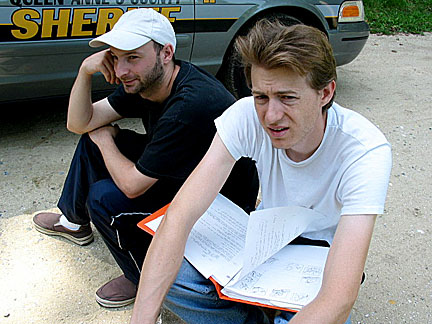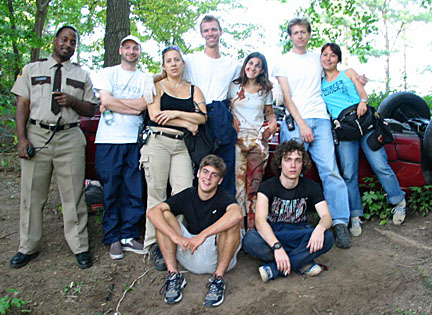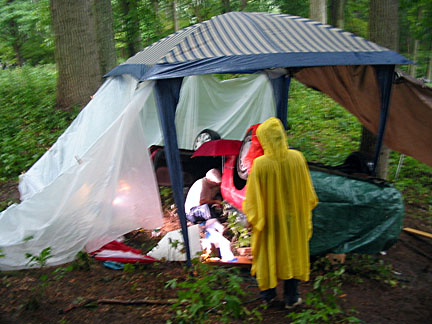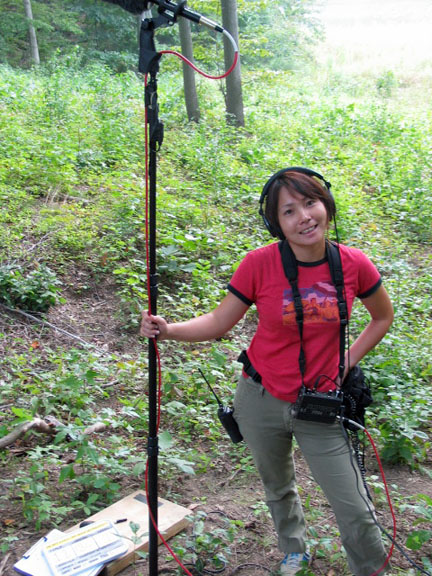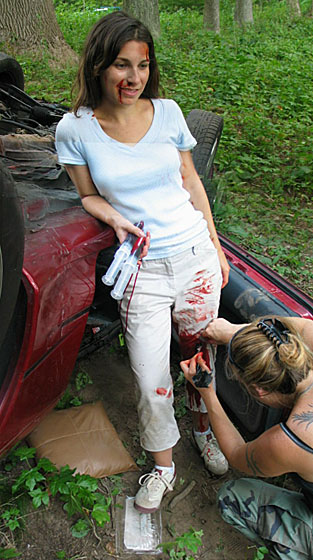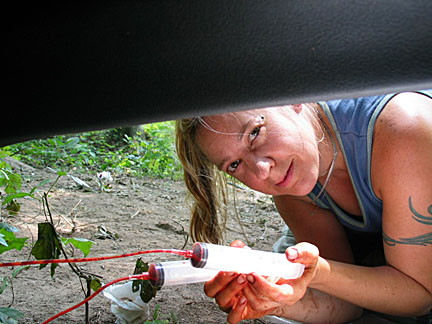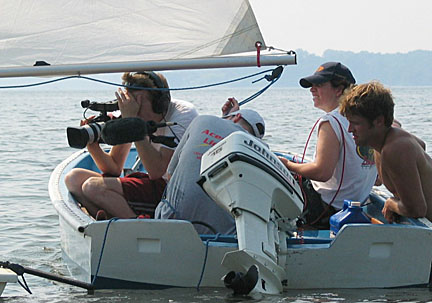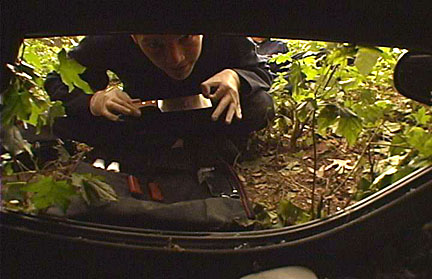Search
A retro interview held by Robert Long II with Filmmaker Jon Clark (©2005)
Robert: Jon, thanks for joining us here at Smash or Trash. Now first off, you have worked with both film and video: which do you prefer to work with, and why? What are the pros and cons of both mediums?
Jon: This is an excellent question and deserves to be first on the list. I’m sure very few other questions will raise such a debate among filmmakers. So I preface by stating, speaking for myself. Film is beautiful. I love film. Love the way it looks. Love the way it feels. Seriously, I miss Super 8, just because it’s really film. I absolutely prefer to work with film. But for the low budget filmmaker, it comes down to one simple decision doesn’t it: shoot on DV now when I have just barely enough money to do it? Or… wait and try and raise a lot more money so you can afford to shoot on film? And for me that’s easy. Why wait? Seriously why? Brad Pitt’s not in my movie and even if he was and I shot it on DV people are still going to go and see it because… Brad Pitt’s in it!
And here’s the sad-sad truth, most low budget filmmakers spend a lot of money on film, but because of their poor lighting package/DP/budget/any number of reasons, it looks like DV anyway! So why waste your money? DV’s getting better and better daily. You’ll transfer to video and edit that way, more than likely your movie will ultimately be seen on video (DVD), and here it is… the bottom line: it’s the story that matters most folks. Audiences can forgive a hell of a lot if they’re emotionally involved in your story. They want to know what’s waiting behind the door of the room the character’s about to walk into, not whether this movie was shot on DV or Film. Only filmmakers worry about that.
If you can afford to shoot on film and get your money’s worth out of it, by all means do it, if you can’t, use DV. I believe it was the great George Clinton who once said, “To each his reach and if I don’t cop it ain’t mine to have.”
Robert: What kind of affordable film or video camera would you recommend to those in the independent film business? What are the pluses and features on these cameras?
Jon: We used a Canon XL1s. I also had a wide angle lens adapter that gave us a lot more, which came in handy in the tight confined space of an overturned car. The camera did the job admirably. My only minor complaint is about the lens. My advice would be to rent/buy the manual focus lens. The regular lens mounted on the camera is good, but you can’t really set focus marks with it. Here’s another trick, if you have to use auto focus and there are focus pulls, or moves in the shot, tap the focus button while following the action. Thank Guus Floor for that tip (practice this first though!). Everything else was great. I hear good things about the Sony DV cameras. And of course good things about HD too. You must get to understand DV (or get a DP who does, that’s what I did), there’s a way to shoot with it to maximize what it can give you (ie how not to get that video look) what are the ideal light conditions? Find out, then find a way to get them. Overcast days are the best. Here’s another word to the wise. DV gets muddy the more post stuff you add to it. So get the image right the first time. We rented a monitor, calibrated it and knew that what was being shown on the monitor was exactly what the final image was going to be. It also helped since I couldn’t be crammed inside the car with everyone else (aw shucks). But I could see if the shot was in focus, if it was a good frame, good performance, all of that. And it’s DV, so tape stock’s cheap, shoot and shoot until you get what you want, and then shoot some more, get as much coverage as you can, in my opinion you can never get enough coverage! Never.
Robert: Jon, what kind of lighting equipment do you use? What do you feel is essential as a basic kit for someone starting out in this business?
Jon: This is difficult to answer because filmmaking takes you to different types of locations all over the world. Instead of worrying about a set lighting package, I’d say get a really good DP, or give yourself as much training and education as possible. Because most of the time I don’t think you need a huge lighting package at all. Not unless you’re lighting an entire mall a la Dawn of the Dead. But you do need something, (and adding to my first answer, if you shoot on film and it’s not during daylight, and you don’t have any lights, it’s going to look horrible so don’t even waste your money on film!) and if you get a really wise DP they should know what the minimum package is (and it really doesn’t take much, Guus my DP is just as inventive if not more so when it comes to getting a result as I am.), tailor the package to the show’s needs. Your DP is your right hand on a shoot. I always try to give him everything he asks for (within reason), sometimes it hurts, but I know in my heart that he’s there to make my film look it’s best and I trust him enough to know that when he comes to me and says he really needs something, he really needs it. Besides I hate it when I know I could make something work really well but I just don’t have all the things I need, so I despise having to put anyone else through that too.
Robert:. You have worked with partners in the past. What are pros and cons to this collaborative effort? What compromises have to be met to have a good creative team up?
Jon: In the film business you must work with people. That’s really what the business boils down to. Be it the set, or getting a deal. Here’s something that I’ve noticed. Lots of people are always “my baby” when they’re directing something. And if you’re working for them and you have a suggestion, they don’t listen because it’s their “baby”. Hunh??? I don’t get it. Really, I don’t get it. I guess they feel that you’re taking away their power or something. But you hire (or delegate) someone for a job for a reason. Let them do it. When they come to you with advice or recommendations for how to do it… well… low and behold… that’s their job! Isn’t it? Isn’t that why you hired them? You’re a fool if you don’t want to listen. Here’s the way I play it. No one is working for me. Yes, I wrote the story, yes I’m putting up the money, yes I’m producing and directing it, and yes I’m doing several other jobs too, but still… no one’s working for ME. We’re all working for the story. Me more than anyone. We (I hope) all believe that the story we’re telling is something that the world should see, so if someone comes to me with an idea that they think might enhance that story in any capacity, I’d be a fool not to listen to them. I might not take their suggestion, but I will do so because it’s not right for the story, not because I wasn’t clever enough to come up with that idea on my own and I’m just jealous or something. And if it does enhance the story… well at the end of the day anything that helps make the story look better makes me look better anyway!!
Robert:. What kind of preplanning do you do for an upcoming film? Do you storyboard? Do you hold script meetings to get feedback on what will and will not work?
Jon: Yes yes yes to everything. I preplan like crazy. First “polished” draft (not first draft, that one I bury for a month then do at least three revisions to) of the script goes to a few “select” people: my DP (and close friend Guus Floor), and my wife. Two very different people with very different tastes, but whose opinions I trust implicitly. I have some artistic talent so I storyboard. I had the schedule, breakdown, and budget worked out by an industry professional and friend Jen Byrne, we went over it and discussed all the different ways to pull it off. Then I do more storyboards. Then before production I had more discussions with Guus, who did further storyboards, and then the night before shooting each day we’d work out anything new or any new changes (as locations will… well… I’ll use the word “evolve” on you). Be prepared. Boy Scout’s motto.
Robert: Jon, are your films self-financed, or do you have investors? If you have investors, what is your advice on how to obtain them?
Jon: Self financed. Thankfully I have a wife who believes in me. Let me add “very” thankfully to that.
Robert: What, of all your projects, has had the largest budget? Which has had the smallest budget? Can you give me examples of where the money goes on a project? Can you give me cost reasons of why one film is more expensive than the other?
Jon: Desperation has had the largest budget to date. But in reality, it’s a no-budget. I cut costs at every single opportunity that I could. Here are some examples: We had a car that flips over. I had a friend find a nice car that didn’t run, it just so happens that another mutual friend’s mother drives that exact car, it’s part happy accident, part my friend knew exactly what he was doing. So I had one car that ran, and one car I could completely destroy. It was the perfect set up.
The money goes where you put it. Burn that statement into your memory. Yes things cost money, but there are millions of ways to cut costs… creatively. Not like a cheapskate, creatively. This goes back to planning.
Lots of money on a no budget movie goes into food. If you can’t pay your crew feed them! Feed your crew. You gotta feed your crew! You’re a selfish stingy bastard that deserves everything bad that can happen to them if you don’t. Most of the time these people are going to be working for you for free or for very low pay, and although they may be enamored of the filmmaking process, if the food is good, they’ll have something to look forward to.
Robert: Is there script-writing or script-formating software out that you recommend using?
Jon: Final Draft. It’s the industry standard. When I first started writing scripts I had this phobia of getting my scripts to look exactly like the real thing. I’d measure the spaces, hold my pages up to real professional scripts in the light to see if I had the right size, font, all that. Way overboard, I still do freak out about it actually. I guess it’s because you always hear horror stories about readers looking for any excuse to chuck your script. Anyway after years of obsessive research I’ve discovered Final Draft accomplishes this look better than most.
Robert: Who comes up with the story and the script? Is it a collaborative effort? Do you allow outside contributors to submit a story outline or synopsis?
Jon: I come up with the stories, and I write the script. It’s mostly a sad and hermetic life. I’d love to work as a collaborator, or with others. I guess it’s just hard to meet someone who’s on my wavelength… how would you try and go about finding someone like yourself to work with? I mean if I found someone with the same twisted ideas that I have, I think I’d actually be afraid of them, rather than wanting to spend months in the same room together.
Robert: How do you go about holding auditions for a new project? How do you get the word out? Where do you hold the auditions? Do you have any sort of form for the actors to initially fill out at the audition? Do you video tape the auditions? Do you allow actors to send in video taped auditions with their resumes?
Jon: I blanketed my world. I called or emailed every college drama department and theater company in my state. I placed an ad in Back Stage East in NY, placed ads on the Maryland Film Commission website, the Craig’s list website, anything I could think of. Between all those I received hundreds of headshots via email and snail mail. My wife and I went through all of them. Word to the wise: Headshots lie. Notoriously so. Some people that look fantastic in a headshot you won’t even recognize in real life, even if you hold their headshot up and compare. And, sometimes someone that has had really bad pictures taken for their headshots look really good in person. And you feel sorry for them because actors spend lots of money on headshots. Also, if an actor doesn’t have a real headshot, don’t even bother calling them for an audition, they’re not serious (exceptions being bit parts… and necessity).
I videotaped the audition. I think you must, especially if you’re dealing with Non-SAG, and the reason for that is two fold, one: simply can they talk and act with a camera present? I know that sounds really stupid and obvious, but… two: Acting in life and acting for a camera are two very different things. They may audition great, but if they don’t come through on the tape, they’re not going to come through in your footage. As it happens when we auditioned for “Desperation” I only had a really cheap ancient VHS video camera to record the actors, even though the image quality was poor, I think it actually helped because you knew that those that came across on that crappy format were those that had quality. Auditions also help you get a feel for the actor’s personality. I have them read, then give them a direction, to see if they can take direction (always very important). I cast in NYC and in my home town in Maryland. In my hometown I got use the local arts theater for free. In NYC I had to rent a tiny space and waiting room from 9-9, we woke up early that morning, (4), drove up to NYC and had actors come in and audition all day, without stop (which was brutal-but necessary for saving money). Then we went home that night (to save more money), started falling asleep behind the wheel, made a quick call to an old college buddy and crashed (our bodies not the car) at his place (and saved money). We reviewed the tapes over the next several days and made our choices. And still we were in need of actors! I began asking anyone, do you know an actor? If so who? Can I have their number? Tap everyone you know and especially people you don’t know, friends have friends, maybe even Kevin Bacon.
Robert: Do you feel it is important to get together with the cast and crew before shooting officially commences to go over the film, the plot, the duties of the individuals, and conduct and etiquette on the set?
Jon: I suppose that can be important. I didn’t really have a big crew or the time to do that though. In a sense I was very lucky, my core crew (basically the ones that were there for me every single day), all three of them: my wife, my DP, and my SPFX person, were all professionals and knew the drill. Any extra people that we had, in other words a PA or two, were usually trained by one of us, usually during that wonderful time I call, first thing in the morning. Because I never had all the actors, all together, all at the same time, we didn’t go over the plot and it’s details. I let the script speak for itself.
Robert: Besides the cast, what does your crew usually consist of? As you probably do not have a grip truck, how is equipment gotten from location to location?
Jon: As far as my crew I had my DP (right hand), my production manager/wife (left hand) a makeup SPFX person who was invaluable, and a series of PAs that assumed various other functions.
No grip truck, try my mom’s station wagon. And my dad’s station wagon. They’re the same brand, same year, but different colors. Nothing beats a station wagon for aerodynamics and trunk capacity.
Robert: How is costuming handled on a project? Is it “everybody wear what you want to wear” or are the costumes actually cleaned and put back on the rack at the end of the day? Does the cast supply their own costuming, is it supplied to them, or do you have a wardrobe allowance for them?
Jon: Let’s just say that I have friend that works with one of the major studios that does not want to be mentioned, I wish I could heap praise upon them and shout their names from the roof tops because they bent over backwards to help me and I owe them a great debt, but alas I will defer to their wishes.
The other costumes we bought. Once we had all the sizes my wife and I went to places like Walmart or Outlet stores. Some we got duplicates for knowing that we would definitely need them. And the clothes were washed (my wife again, did I mention that she was my left hand yet?), unless continuity dictated that they couldn’t be. Which it did sometimes, much to the chagrin of my lead actress.
Robert: You have worked both within sets and natural locations. What are the pros and cons of both?
Jon: Control. Sets give you control and comfort. Locations are nebulous. Things change, (like the weather) and you must be able to change with them. Immediately. Here’s a good example. While we were shooting at our location which was an overturned car in the middle of the woods, it started to rain. One of my friends had lent me an open air tent. We pitched the tent over the car, and then fastened plastic tarps to it with clothes pins to make it even larger. After a quick trip to the 99 cents store my wife had rain ponchos for everyone. We ran some cable from our RV in the far distance, which had a generator on it, down the hill to our car. Guus lit the car to look like normal regular everyday sunlight, despite the fact that we were in the midst of a gloomy torrential downpour. Every time I called action, the rain came. I felt like the Bizzaro version of Moses. But we got the shot.
Robert: Jon, you’re on the set, miles from civilization, and “nature calls”. When on remote locations, how have you handled bathroom facilities for cast and crew?
Jon: I was very lucky, I had a neighbor that let me borrow the use of his RV while we where on location. Which was a godsend. In addition, he let me use a car battery/gag that he had created for use with his computer. A great idea/invention that I recommend 100% to anyone. It’s basically a car battery with an adapter and a AC/DC converter that has two standard plugs to it. We ran our camera and the monitor off of it. As I recall it never ran out of juice, not once for our entire shoot. It’s only draw back is that a huge car battery like that weighs about 70 pounds. And that battery, no matter how great it was (and it really was) became my scarlet letter. I’d have to heft that damn thing up and down a hill in the woods several times each day. I still have nightmares. Goddamn battery.
Unfortunately my neighbor needed the RV back for the final four days of shooting, and well… nature does call. Thankfully, a person in the neighborhood of our location (which was for all intents and purposes a road through the woods) not only helped us secure this location, but lent us the use of their bathroom as well.
Robert: What kind of food prep, or catering do you set up for the cast and crew on film days? What kind of food is available and prepared?
Jon: I was very lucky, (I’m trying not to start each answer with that phrase, but I ain’t gonna lie, I think it was Napoleon who said something to the effect of “I’ll take a lucky soldier over a good one anytime”, and he was right.) my brother and his wife own a fine restaurant in my hometown (shameless plug: a spectacular restaurant called Julia’s, so go there!), we purchased lots of food beforehand, and they helped prepare it, at no cost. We bought in bulk for Craft Services (my wife again). My mother also prepared lots of the meals, and was kind enough to prepare most dinners for us as well. She was basically like our den mother. Love ya mom.
One final thing. The community at large knew I was making my film and out of pure kindness would bring over dishes for us. I know that sounds kind of funny or perhaps even folksy, but when an actor’s been baking in the sun all day for you for free, then they get a good meal and someone brings over a chocolate dessert made especially for them, which just happens to be their favorite, they’re going to be happy. And that my friends, is magic.
Robert: While you may have employed special effects artists and make-up artists in your films, have you ever used a make-up artist for the glamour of the actors and actresses, or is that up to the individual performer?
Jon: Firstly, in my notice for SPFX artists I made sure to define their role as both. And that’s very important in all areas of production, define everyone’s role up front. Everyone working for me knew way ahead of time that this was a low budget show and that jobs would overlap. My DP also performed the roles of an entire Grip/Electric department. My wife did about the job of fifty people: basically all of production, Craft Service, Wardrobe, etc, etc, seriously etc. My SPFX artist pitched in and helped carry equipment like a grip and read lines like a script supervisor would have. And each did so willingly and without any complaint.
In my experience most professional SPFX artists are fully trained in all areas, and as they weren’t large numbers of characters every single day, I didn’t think it would present too much of a problem. As far as actors wanting to do their own makeup, well I’m sure Joann would have been fine with that (more time for her to do the fifty other things she had on her plate) but I’d prefer it was someone who had more experience doing it as opposed to the actor. Doing makeup and doing makeup for film are two different things.
Robert: While perhaps most of your actors and crew might be from your local area, how do you handle actors and actresses that have to come from out of state. Where are they put up after the day wraps?
Jon: My wife, and I (but me only occasionally) took an almost daily, definitely weekly, 2 hour round trip up to Wilmington Delaware where they had the closest train station to my town. Most of my actors were from NYC so we’d get them a train ticket and keep them for as long as they could manage. Two of my actors wanted to drive down, which we were fine with, less work for us!
I was very-very lucky (there I go again, but this time I threw in another very) with accommodations. My Uncle has a house in town, unfortunately he’s had some heart troubles so he was staying with my parents. Therefore his house was open and he was kind enough to make it available to me. Think about that for a moment, how many people would let a bunch of complete strangers have full run of their nice house for about a month? Now you’re getting the idea about what I mean when I say lucky. It was sometimes a juggle determining who stayed where and when but we (okay my wife) worked it out.
Robert: Due to the many different personalities that you can encounter from cast and crew, how do you handle any friction or situations that spring up from time to time?
Jon: That’s a great question.
You have to understand that a movie set is a highly demanding, pressure driven environment. What I always say is that you are living life at 100%. Everything is now. Maybes are unacceptable. You don’t get a light rejection, you get bold No’s. Never’s. Or you get a big fat Yes. It’s life or death. Do or die. It’s find a way. Because we have to, we have no other choice. And I love it for all those reasons. In fact, my wife and I have a theory that every time the phone rings when you’re in production, it’s bad news. Every time. You only get good news when YOU’RE making the phone call. Trust me on this.
Our shoot was almost as smooth as silk. But when there were minor altercations, and they were very minor (it happens) I’d take people aside (NEVER do you talk out loud in front of everyone) and have them get it out. Then I’d usually tell them that whenever they had any kind of problem with a situation, a person, anything, to take it out on me. Put the problem on my shoulders as well and I’ll find a way to deal with it. I can take a lashing, in fact I should, hell it’s my movie! They were working mostly for free! Here’s the way I see it. Most of the time grievances are simple. People usually don’t like the way people do this, or that. But when you’re in production you must NEVER allow yourself to be swayed by anything petty, or anything that’s just completely outside of your control. You must chart and set your course, lash your body down to your seat, and start to paddle, paddle, and paddle, and fucking paddle, and no matter how badly you may want to scream you hold it in, because screaming isn’t going to get you to shore, paddling is, and it’s not about you anyway, it’s about the story. And when it’s your project, your story, YOU, more than anyone else, must take the lead, YOU more than anyone else, must sacrifice. If you don’t, no one will follow (unless you pay them lots of money, see Hollywood for examples).
Robert: Have you dealt with nudity in your films? What is the proper conduct and the way to deal with this matter so everyone involved is comfortable, and you get the shots you need?
Jon: I haven’t, but I think this goes back to being very up front and honest from the very beginning. You can talk to the actor to determine their feelings for the actual shooting of the scene and do anything possible to make them comfortable. But when it gets down to it, and I’ve seen some great directors do this, just explain what you’re looking for, just the way you’ve done in every other scene.
Robert: How do you go about scheduling actors and crew members for the days they are needed? Do you have someone in charge of continuity, logging and such?
Jon: My friend Jen Byrne worked out the wisest possible shooting schedule, she’s done this for several-several years and she understands the low budget realities. She created an indispensable schedule that we, with very few exceptions stuck with. This proves that theory that going out to Hollywood and working on low budget shows is good. Because one: you learn the realities, and two: you meet people like Jen, and if these people are pros and they’re kind enough to help out with areas where they have WAY more expertise than you, you win. You save yourself lots of headaches too.
I didn’t have script supervisor. I wish I did. They would have had nightmares from my show…
Robert: Do you shoot just weekends for a feature, or have you had a scenario where everyone takes a week off to shoot the full week non-stop?
Jon: I firmly believe that you must fully commit yourself. Set up a point of no return (for instance quitting you’re job, booking a flight, something of that caliber) and trust me, once you’ve passed it you’ll find a way to get everything done… you have to now. And I believe you’ve got to go nonstop. If you do stop, guess what happens? Besides your actor suddenly changing his hair style? Conflicts. Of all kinds. And let’s say surprise-surprise that your first few days of shooting don’t go so well… well next week when you’re scheduled to resume, those 15 PA’s/people/actors/friends (yes even friends, yes even close-best friends) that you had on day one suddenly can’t make it to the set. Why? Maybe the illusion that ‘making a movie isn’t work’ disappears. Maybe the actor determines that you’re no good, so why should she ___? (fill in the blank with that scene/moment in your script that she’s been really dreading.) In fairness they could all have very good valid reasons. And, in fairness they could do this even when you plan to shoot nonstop (trust me they do)! But why give them the chance? Why give them the time to think about it at all?! Save yourself the drama! Lock them down and bulldoze your way through come hell or high water.
The ONLY possible exception is that you just absolutely cannot. You’ve thought of everything and you just can’t. You’re sickly family will die without you there to support them during those short weeks that it takes. Okay, okay, but as a favor to me (and yourself) work your ass off and promise that you will finish. I had to quit my soft cushy job with great benefits. To this day I have had severe trouble finding another job, let alone one as good. Was it worth the trade? I will never regret it. Never. Even if my aspiring career fizzles away to nothingness and I’m stuck rotting away in an accounting office cubicle for the rest of my life, I will never regret it.
Robert: What importance do you put on having a crew member documenting the behind-the-scenes making of the movie, as well as taking photos of the characters at the locations and sets you are using?
Jon: In retrospect I wish I could have had more behind the scenes photos, but I’m pleased with the ones we have. And one of the advantages of shooting on DV is that if there’s a really great moment, you can take it and use it as a photograph.
Robert: Jon, some filmmakers do everything they can to cover brand names of products in a movie, some blatantly don’t care if they show. What are the rules to product placement? Have you ever used any product placement in your features?
Jon: We went out of our way to cover up brand names or find a way to hide them. I don’t think you need to worry too much about it unless your movie makes oodles of money, and then the company who’s product you’ve highlighted will probably come and want a piece. I’ve never used product placement before, haven’t had to worry about it, most of my neighbors don’t know me, so I highly doubt Coca Cola does…
Robert: Since everything is practically done on computers these days, can you tell me what software you edit your features with? Are you on a Macintosh or a PC? What do you feel is the bare minimum of hardware and software that you need to edit a feature?
Jon: Currently I’m editing. We’re using Final Cut Pro on a Mac. As to the second part of that question, I’ll have to answer that at a later date. But for today I’d have to say space. We have 30 hours of footage.
Robert: Are there any genres that you wish you were doing, but can’t because of money constraints (or the market isn’yt there) and is there any genres that you refuse to touch, and for what reasons?
Jon: Oh yeah, there’s a director I’ve been watching all the movies of recently, he’s not great but he always puts an original and skewed slant on everything he touches, he’s a Japanese director named Takeshi Miike. Like I said he’s not a genius, and most of his movies have serious flaws, but the guy makes like 5 movies a year! FIVE FUCKING MOVIES A YEAR! You’ve GOT to respect him for that. I’m insanely jealous. That’s what I want! I want to try it all. If Hollywood ever gave me the keys to the castle… I’d never give them back.
There’s no genre that I refuse to touch. Why pigeon hole yourself? You change, you grow, it’s part of life. You know I used to say that I hated all Country music, probably because it made me sound cool. Well I’ve gotten over that, much as I’d like to be, I ain’t no Steve McQueen, King of Cool guy. Now, I don’t love Country music, it’s by no means the first thing I go to listen to… but admit it, there ARE a few good country music songs out there. And by completely denying it, it only shut me off to something that might inspire me in a way I’d never thought of. Yes, that sounds very-very strange but would you believe that I got the flash of inspiration to write Desperation while I was flipping through the pages of The Weekly World News? True.
Robert: In this age of DVD competition, do you feel it is important to pack extras such as commentary, behind the scenes, and bloopers?
Jon: Sure. I love to watch that stuff.
Robert: Have you ever had to deal with insurance, location permits, or completion bonds on any of your movies?
Jon: Insurance. Didn’t have it. Stupid. We had three boats on the water, we flipped over a real car… twice. The lead actress worked inside an overturned car that was filled with glass for two weeks. Real glass. No insurance. No one got hurt, but they had ample opportunity. I was stupid. No sir, I don’t recommend it.
Location Permits. Well my wife called the Maryland Film Commission to ask them about that. They’re very nice, and it was pretty funny because when she told them where we wanted to shoot they said, “Where? Centreville, oh I know where that is… but how did you ever come up with Centreville?” Because it’s a tiny small town that’s completely off the radar. Once she explained that her husband was from Centreville they immediately understood. It could be the only explanation for them. Basically everything was fine because it was up to the town whether they would let me shoot there or not. I only had one shot that was on public property, and that day we had a Deputy from the Sheriff’s Department working with us. He was great. He was the most enthusiastic guy, let alone police officer that I’ve ever met, and I know he had a lot of fun with us. He would stop traffic, and I never even had to ask him to! He’d just go and do it. And this is the main street that runs right through my town!
Robert: What is the best way, circumstances, and procedures to go about doing a “high speed car chase” for an independent film?
Jon: Become best friends with the local police, the local junk yard, and the local guys that tow cars for a living(Especially if the cars are not going to survive the chase). You’d be surprised at how happy they’d be to help you. Think about how cool it’d be if someone came to you and asked you to help them plan a car chase/accident. They love it. Especially when you’re footing all the bills! Plan everything out. Shots. Everything. Get matchbox cars and you can talk everyone through it. Cars always look like they’re going faster than they actually are in video. In other words you can go at almost half speed. Get lots of coverage. Simple shots, like street signs, feet pressing down on accelerators, cars racing by things, faces, reactions to the chase, tires, all these things can really enhance the pace and excitement of the chase. And they help to make it seem like the sequence has got scope. Don’t’ forget in camera effects, ie know your history, for instance: long lensed shots condense the screen and make things look really close together, (see any film by Tony Scott). The camera is always your friend. Study up and you will be rewarded tenfold. Go to ebay and get Don Dohler’s magazine “Cinemagic”. Then send Don a “Thank you” letter. He was helping independent filmmakers like you and me solve all our technical problems before anyone. The man is a gem. Do this now.
Robert: How do you choreograph you fights and stunts to where there is the maximum of action and minimum of danger to the performers? Do you use padding? Do you use mats and empty boxes for the more dangerous falls? Have you had any mishaps on the set?
Jon: Yes. Protect your poor actors. Get padding, do rehearsals. We had a scene where my actress had to whack an actor’s arm with a real crowbar (because every prop crowbar I saw looked completely fake) so I got a large PVC pipe, we padded his arm, put the PVC pipe on top, and covered it with his costume. Then he could get hit pretty hard. The sound was all wrong, but that’s what sound effects are for. Again, know your camera. Know the angles that most effectively show a hit. Can you cut from a hit to the person receiving the hit on a whip pan? There’s a way to pull it off safely. Just brainstorm a bit, and always have a back up plan, just in case.
Robert: What is the correct and safest way to use a gun with blanks loaded in it on the set or location? Do the performers wear earplugs? Is there any padding involved? Should the local authorities be informed that blank gunshots will be going off at such and such a location?
Jon: I would recommend finding someone. Preferably a professional that has done guns and blanks before. Get their advice, and if they’re kind and willing, ask them to come help. I am deathly afraid of guns. I was lucky, Joe Ripple a director for Timewarp Films, also a Baltimore County Police Detective (and a super cool guy) was cajoled into coming down to our location. He had the gun, the blanks, and he had done all this many times before. First of all, the guy just exudes professionalism. And you can always spot a professional. Seriously, the moment he stepped on the set, my heart rate slowed back to normal. The very first thing he did was show everyone what the gun looked like and that it was not loaded, that only he had the blanks, and only he would load it, and in front of them. He was really wonderful and patiently answered any question anyone had, and helped cool everyone (ME really, everyone else was fine) down. Anyone that wanted to could wear earplugs, but the blanks weren’t very loud actually.
I had informed the police days in advance and per their request gave them a call the day before as well. Since we were shooting out in the woods, honestly I don’t think anyone even noticed. And if they did, they thought it was a hunter, which is common for that area.
Robert: Jon, you are doing an action sequence in your movie, with fake guns and whatever, and a squad of real law enforcement pulls up. What is the most appropriate way to deal with this so it does not become a serious situation and delay your shooting schedule?
Jon: There is a very easy solution to this. Have the police on your side from the very beginning. That is my “please follow” advice. However there’s a down and dirty answer too… have a go-to person that’s really good with people on your team, have them intercept whoever’s giving you beef, meanwhile you and your crew bust your ass and get every necessary shot until they actually make you leave. Trust me even the big boys play this game.
Robert: Knives, axes, machetes, etc. can be really dangerous if not used properly in films. Have you used fake cutlery in your movies, or what has been done on your films to get around that danger factor?
Jon: Absolutely. I had two sets of all the knives and such. Someone dulled down all the blades using some heavy piece of machinery on one of the sets of knives. (I found most of these knifes in the local 99 cents store so they weren’t very sharp to begin with.) The sharp set was used for picture and the dull ones would be swapped in when it came time to get close.
Robert: Were are the advantages and disadvantages of working with SAG or non-SAG actors?
Jon: SAG actors are more expensive. SAG actors are union which means they follow union rules (lunch at a certain time, turnover etc.). And contracts, LOTS of contracts… SAG actors however are professionals. They work on professional shows, they know the drill and have much more experience. However… there are some really great NON-SAG actors out there. If you’re putting together your first low budget movie, I’d recommend that you go NON-SAG, unless you can get a name actor. SAG unfortunately has it’s disadvantages. Lots of them actually. The poor actors that join can only work on SAG shows. Which is great, and not so great, if you live in say Maryland in my home town and you’re SAG. You’re SOL. How often is a professional show going to come to town, versus; how often is a low budget NON-SAG independent made? And with few exceptions SAG actors are not supposed to work on non-union shows. And don’t forget you’d still have to pay your SAG dues while you’re waiting, hoping, and praying that a SAG movie will come, and actually cast you, as opposed to Robert Deniro. Look don’t get me wrong, I have nothing against SAG, actors are mistreated, abused and ripped off constantly and SAG’s reason for being is to see that that doesn’t happen. But it’s a shame because it’s very hard for any serious actor to actually get into SAG and get protected. Very Catch 22. I’m sure you’ve heard this before, but it’s true, it sucks to be an actor. It really does, so if anyone, SAG or NON blesses your production by acting in it for you, treat them with the utmost respect. I shall now step down off my soap box.
Robert: What genres do you enjoy working the most in? Are there any genres that you wish you could work in but cannot because of budgets?
Jon: When I was in second grade, my friend’s mom took us to a movie, but all she’d say about it was, “You’ll like it.” Now I had seen movies before. I had seen outer space adventure in Star Wars. I had seen incredible action in Raiders of the Lost Ark. But nothing, NOTHING had prepared me for what could happen in one mundane apartment complex. My emotions were pushed as I fell in love with the lead actress, pulled when I agonized over their ultra-risky attempts at detection, and poked as I sat gripping my chair, praying, willing the wheelchair bound protagonist to find a way, any way to just – – (well… I won’t ruin it for you). I had just seen the re-release of Alfred Hitchcock’s Rear Window. And I liked it. Oh I liked it alright… I liked it so much that from that moment on, I got every book I could find that had Hitchcock’s name on it (still got ‘em baby). I used my allowance to get a subscription to his mystery magazine. I even forced my parents to let me stay up until eleven thirty (I was only in second grade!) so I could watch reruns of his television show. All I knew then was that I wanted to see more. Now I understand why. My education had begun. When all the other kids were talking about their heroes, mostly sports figures, I was talking about mine, an overweight balding man with a droll English accent. Alfred Hitchcock was my hero. Still is. He was the Master of Suspense. And “Suspense” is the genre that I love the most, no matter what form it may take. It’s where all our thrills live.
Ah yes the budget. Most of the time, I try and come up with a concept that could be made for a small budget. Let’s just say it’s easier that way. But that’s not the way inspiration works is it? It all depends on the idea. I’d love to get paid lots of money, who wouldn’t? I’d love to play with all the big toys, again, who wouldn’t? But at the end of the day, I think what excites me the most, and should inspire every filmmaker out there reading this, is the inner knowledge that if I have an idea for a medium sized budget movie, and I really want to make it, and no one in Hollywood is willing to take a chance on paying me money to make it for whatever reason, and I know they’re wrong… I can walk away at any time, go back to my roots and make it anyway, because right now, better than any time before, the technology is here, and there’s nothing to stop me from actually pulling it off. And on top of all of that, it will get seen, there is an audience. There are people and festivals out there that are just waiting for us to blow them away. Don’t take that lightly, it’s powerful stuff.
Now I know that doesn’t answer the question, but in a way it does. It’s all semantics. In his epic graphic novel “Watchmen” Alan Moore wrote it best, through his character Rorschach, who trapped in prison with hundreds of inmates that want to kill him, turns to them and defiantly says, “None of you understand. I’m not locked up in here with you. You’re locked up in here with me.” Fucking A right!
Robert: Jon, what is has been your best experience on a film? What has been your worst?
Jon: Making Desperation was my best. I loved every second of it, and when it was over, I had a feeling that what we had all just done was something we could be very proud of. Although there wasn’t one particular moment that stands out as better than the rest, I just remember waking up at five every morning and going downstairs to drink a cup of coffee and stare into space for a few moments before the madness began. My father is an early riser and was always there reading the newspaper. He would ask me what was planned for that day and through my groggy haze I would tell him. Things like: we’re going to flip a car over. Or get three boats together and shoot a seven page scene in one day. Or shoot in the firehouse, and on the main street that runs through the middle of town. Or in a hospital. Or shoot 12 pages today (without one single PA to help) because we’re going to lose an actor forever if we don’t . He’d always ask me the same questions. Which although he phrased them much more politely, boiled to “how on earth do you think you can even hope to pull that off?” And I had no answer for him. But we did. Every single time, we pulled it off.
My worst experience was a student film that I helped out on in my college days. It was shot down in New Mexico, mostly in the desert. As soon as we arrived at the place where we were going to be staying, I was shot at. Yes you heard me correctly, shot at. I heard the buck shot hit a tree right behind me. Turns out a neighbor thought that we were robbing the place. Now, why we would be using an RV to do it, and instead of taking things out of the house and into the U Haul trailer, we were putting things into the house, might be explained by the fact that the gentleman in question (that is, the one firing) had a six pack attached to his belt and was what I like to call half-in-the-bag. He certainly felt sorry enough the next morning to offer to “go out and skin a live raccoon” (his words not mine) for us, so we could have it’s pelt as a token of his good faith. Politely, we declined. Shooting didn’t go any better. While shooting miles from nowhere, in the desert, the temperature suddenly took a sharp decline from a beautiful sunny day (some of us had our shirts off) to a blanketing flurry of snow I wouldn’t hesitate to call a blizzard. Just like that. Of course our RV (and only source of transportation) had just left to go to Albuquerque. So we (the crew and actors) had to carry all out equipment a mile out of the desert, back down to the nearest dirt drive (not road, that would have been another five to ten miles away) through the now six inch deep snow to the spot where the RV would return to pick us up… some time in the near future(having completed it’s two hour drive to Albuquerque) While waiting for the RV to return I distinctly recall members of the crew (myself included) walking in a large figure eight, repeatedly walking that same pattern, again and again. I don’t know about anyone else but I definitely felt like singing a Russian work song. I probably did. That was the first day of shooting. Trust me it didn’t get any better.
If you are ever in this type of situation (ie freezing your ass off) go immediately to the local sporting goods store, they have these tiny little heat pads that you can slip easily inside your shoes and gloves. No it isn’t much… but it sure helps.
Robert: Jon, do you recommend hiring an attorney familiar with contracts before you sign a distributor’s contract? Should you have a lawyer in general?
Jon: Ha-Ha-Ha! In this day and age… get a lawyer.
Robert: What sort of contracts do you recommend that need to be used on an independent film? Are there any books or websites that you would point someone towards to learn more about these forms and how to obtain them?
Jon: There is a wonderful book with all the professional contracts (that you can photocopy) and it even comes with a CD that you can print out from your computer. It’s called, “The Complete Film Production Handbook” by Eve Light Honthaner. You can find the book on Amazon, and here’s a great trick for a poor independent filmmaker (for anything really), always go to the used items on Amazon, they’re always cheaper and usually you can get them brand new anyway!
Robert: Is there anything else you would like to add to those who are trying to get into the independent film industry?
Jon: Know what you want. In all areas of this business, but most especially on the set. In fact this is the golden rule as far as I’m concerned. I’ve worked with so many student and professional directors that just don’t know what they want. And they try and find it as the day progresses; this is the biggest waste of time you could imagine. Preplan, storyboard, create a shot list, know what you want. Time is money. You don’t go to the set with a plan to discover. You get to the set with a plan and discover.
Jon Clark is an incredibly talented filmmaker. Originally from the Maryland area he has been in Hollywood for nearly a decade. His film DESPERATION is one of the most bone-chilling suspense films I have ever encountered. You can get in touch with this independent mastermind through his facebook page.
